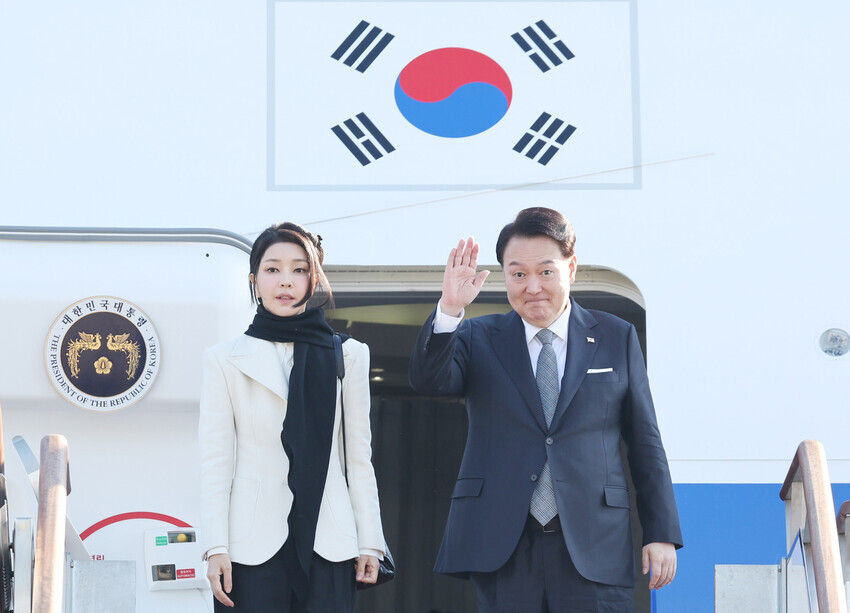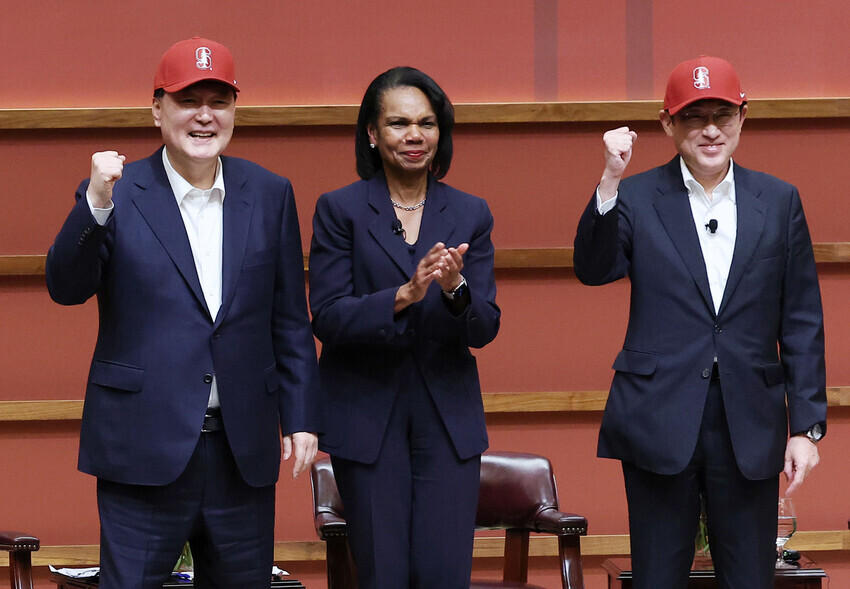hankyoreh
Links to other country sites 다른 나라 사이트 링크
[News analysis] Brushed off by US and China, Yoon’s biased diplomacy undermines inter-Korean peace

Diplomatic efforts to achieve peace on the Korean Peninsula have lost their way. Due to the Yoon Suk-yeol administration’s biased diplomacy in the name of “values diplomacy,” the compass that would have guided us from an armistice regime to a peace regime appears to have broken. The 30th Asia-Pacific Economic Cooperation (APEC) leaders’ meeting that took place in San Francisco last week sounded the alarm for the disappearance of peace diplomacy on the Korean Peninsula in addition to laying bare the true color of biased diplomacy a la Yoon.
First, it is problematic that a summit between Yoon and Chinese President Xi Jinping did not come to pass. Although an official from the presidential office assured on Sunday that South Korea and China are carrying out “sufficient communication concerning pending issues between them, as their foreign ministers will be meeting in the near future,” this is clearly a self-interested excuse. As one former high-level Foreign Ministry official said, “One summit is more effective than ten foreign ministers’ meetings when it comes to relations between two sovereign countries.” Since taking office in May 2022, Yoon has met with Xi only once, on Nov. 15, 2022, for 25 minutes during a Group of 20 summit in Bali, Indonesia.
A South Korea-China summit falling through is even more upsetting in light of the 65-minute-long bilateral summit Japanese Prime Minister Fumio Kishida had with Xi on Thursday. Even though Seoul and Tokyo are both in conflict with Beijing due to their focus on their bilateral alliance with Washington and cooperation among South Korea, the US and Japan, they each achieved wildly different results. Xi and Kishida reaffirmed their countries’ “mutually beneficial strategic relationship,” acknowledging the existence of conflict while agreeing on the need for cooperation. The fact that the two leaders met for more than one hour during a multilateral conference demonstrates they both strongly desired a bilateral summit.
South Korea’s need for a “mutually beneficial relationship” with China arguably exceeds that of Japan. China is not only South Korea’s biggest trade partner but also a signatory of the Korean War Armistice Agreement, not to mention a de facto “guardian state” of North Korea. China’s strategic cooperation is not an option for South Korea’s pursuit of a peace regime on the Korean Peninsula through economic development and denuclearization but a requirement.
Second, it’s noteworthy that Yoon failed to hold a bilateral summit with US President Joe Biden after going all the way to San Francisco. The Yoon administration may say the need for a South Korea-US summit wasn’t significant, as Yoon met with Kishida and Biden during the Camp David summit on Aug. 18 and held a 10-minute closed-door talk with Biden on Thursday. However, Kishida judged differently, meeting Biden in a 15-minute bilateral summit on Thursday.
It's alarming that South Korea failed to have a summit with either the US or China.

That a bilateral summit between Yoon and Xi did not come to fruition despite the two leaders being at the same location at the same time seems like an alarm bell indicating that South Korea-China relations may grow more strained than they ever were. By skipping a South Korea-US summit, Biden showed how he discriminates between Japan and South Korea despite pressing for South Korea-US-Japan trilateral cooperation.
A former high-ranking government official told the Hankyoreh on Monday, “This is the outcome of South Korea’s loss of its independent voice and diplomatic autonomy on account of Yoon pushing for biased diplomacy in the name of values-based diplomacy.” The Yoon administration’s one-dimensional diplomacy has left both China and the US without a reason to care for South Korea.
The US-China summit also demonstrated South Korea’s lack of presence on the diplomatic stage.
Remarks made by Biden and Xi prior to their summit, which were made public on Wednesday, did not include any mention of the Korean Peninsula by either leader. This was also the case during Biden’s solo press conference after the summit. Biden not once referenced the Korean Peninsula problem, which also had no presence in China’s announcement detailing the summit’s outcome. The only reference to the Korean Peninsula could be found in a readout published by the White House which noted that Biden “emphasized the US’ enduring commitment to [. . .] the complete denuclearization of the Korean Peninsula.”
Considering that the US is South Korea’s only ally while China is its biggest trade partner, not to mention the fact that both the US and China are signatories of the Korean War Armistice Agreement, the indifference the two countries’ leaders showed demonstrates how weak the momentum for peace diplomacy on the Korean Peninsula — including efforts for denuclearization — has become.
Another former official at the South Korean Foreign Ministry remarked, “Diplomacy is the art of expanding a country’s options by influencing the other side’s strategy through means other than war, but Yoon has been reducing his diplomatic options by pursuing the so-called ‘values-based diplomacy,’ which doesn’t work in the harsh world of international relations.”
By Lee Je-hun, senior staff writer
Please direct questions or comments to [english@hani.co.kr]

Editorial・opinion
![[Editorial] Intensifying US-China rivalry means Seoul must address uncertainty with Beijing sooner than later [Editorial] Intensifying US-China rivalry means Seoul must address uncertainty with Beijing sooner than later](https://flexible.img.hani.co.kr/flexible/normal/500/300/imgdb/original/2024/0517/8117159322045222.jpg) [Editorial] Intensifying US-China rivalry means Seoul must address uncertainty with Beijing sooner than later
[Editorial] Intensifying US-China rivalry means Seoul must address uncertainty with Beijing sooner than later![[Column] When ‘fairness’ means hate and violence [Column] When ‘fairness’ means hate and violence](https://flexible.img.hani.co.kr/flexible/normal/500/300/imgdb/original/2024/0516/7417158465908824.jpg) [Column] When ‘fairness’ means hate and violence
[Column] When ‘fairness’ means hate and violence- [Editorial] Yoon must stop abusing authority to shield himself from investigation
- [Column] US troop withdrawal from Korea could be the Acheson Line all over
- [Column] How to win back readers who’ve turned to YouTube for news
- [Column] Welcome to the president’s pity party
- [Editorial] Korea must respond firmly to Japan’s attempt to usurp Line
- [Editorial] Transfers of prosecutors investigating Korea’s first lady send chilling message
- [Column] Will Seoul’s ties with Moscow really recover on their own?
- [Column] Samsung’s ‘lost decade’ and Lee Jae-yong’s mismatched chopsticks
Most viewed articles
- 1[Editorial] Transfers of prosecutors investigating Korea’s first lady send chilling message
- 2[Column] US troop withdrawal from Korea could be the Acheson Line all over
- 3[Exclusive] Unearthed memo suggests Gwangju Uprising missing may have been cremated
- 4Xi, Putin ‘oppose acts of military intimidation’ against N. Korea by US in joint statement
- 5‘Shot, stabbed, piled on a truck’: Mystery of missing dead at Gwangju Prison
- 6[Column] When ‘fairness’ means hate and violence
- 7Spotlight turns to Hyundai Group Chairwoman’s visit to North Korea
- 8[Column] Samsung’s ‘lost decade’ and Lee Jae-yong’s mismatched chopsticks
- 9[Column] Will Seoul’s ties with Moscow really recover on their own?
- 10[Editorial] Intensifying US-China rivalry means Seoul must address uncertainty with Beijing sooner t